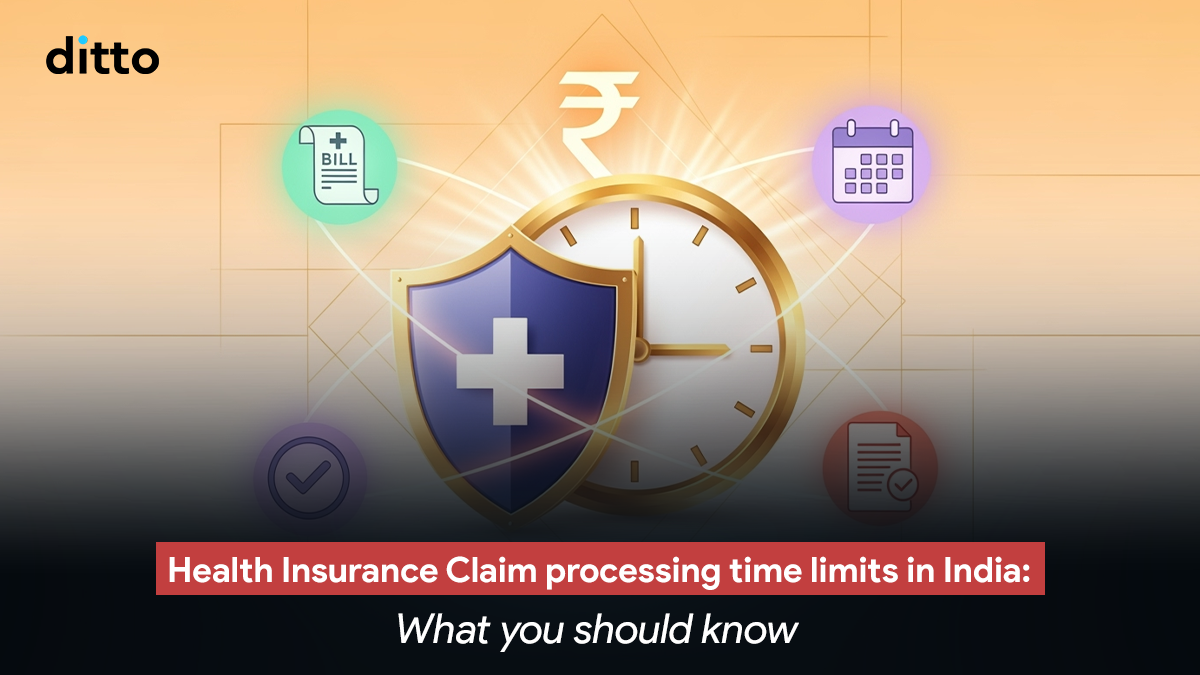| What are the time limits of health insurance claims in India? In India, each health insurance policy has specific deadlines for when you must file a claim. For planned cashless treatments, notify the insurer 3–5 days before hospitalization for approval. In emergencies, inform the insurer’s desk or hospital TPA for cashless settlement within 24-48 hours of admission. For reimbursement claims, submit documents within a week of discharge; IRDAI allows a formal maximum of 30 days for hospitalization and 15-30 days for pre & post-hospitalization expenses. OPD claims can be filed weekly, fortnightly, or monthly. Early filing ensures quicker, smoother processing and faster settlement. |
Filing a health insurance claim in India? Timing plays a crucial role. Knowing the exact time limits for cashless and reimbursement claims can help avoid unnecessary delays or rejections. Regardless of whether it's an emergency admission or a planned procedure, IRDAI has set clear timelines for insurers to follow.
In this guide, we'll walk you through these deadlines, required documents, and penalties insurers face for delays so you can get your health claim without any hassle.
Still unsure how to file your health claims within time? Book a free call with us and let our experts help you file your claim on time.
| Did You Know? As per IRDAI Guidelines, if your health insurance claim is delayed, the insurer must pay interest at 2% above the bank rate from the date the last required document is received. If an investigation is needed, they must complete it and settle or reject the claim within 45 days. |
What is the time limit for cashless claims?
Cashless claims allow you to get treated at a network hospital without paying out of pocket; the insurer settles the bill directly. However, to use this facility smoothly, it’s essential to inform the insurance company within specific timelines.
- For emergency hospitalization, you must notify the insurer within 24 to 48 hours of admission, or before discharge, whichever comes first.
- The insurer should be informed at least 48 to 72 hours before admission for planned hospitalization (non-emergency), such as pre-planned surgery .
| Point to be noted: As per IRDAI guidelines, insurers must respond to cashless authorization requests within one hour of receiving them. Once the hospital sends the discharge authorization, the insurer must issue the final approval within three hours. |
How long does it take to process reimbursement claims?
Reimbursement claims mean you pay up front, then ask your insurer to repay you. The time frames in India typically work like this:
- For hospitalization, day‑care, or pre‑hospitalization costs, submit the claim within a week of discharge, though most policies allow up to 30 days from discharge.
- For post‑hospitalization expenses (tests, medicines, etc., after leaving the hospital), submit the health claims within 15-30 days after the post-hospitalization coverage period is completed.
Once you submit all required documents, the insurer has time to process the claim. As discussed above, claims should be settled or rejected within 30 days of receiving all required documents. If an insurer needs to investigate further, the deadline extends to 45 days, after which they must pay interest.

Usually, the insurers can uphold the TurnAround Times (TATs) since they can request a document before the 30-day window and prevent any potential TAT breach.
| Friendly Reminder: Timely intimation ensures the insurer can process the pre-authorisation request (valid for 15 days from the date of issuance (or expiry of the Policy, whichever is earlier) and coordinate with the hospital. Delays in notifying the insurer may lead to approval issues, longer wait times, or even rejection of the cashless facility. In such cases you’ll have to pay upfront and later submit a reimbursement claim. |
What are the factors influencing Claim Processing Time?
Several factors affect how long it takes from filing the claim to getting paid back. Here are the key ones:
1) Completeness of documents:
If your medical bills, discharge summary, test reports, doctor's prescriptions, identity proofs, etc., are all correct, clear, and complete, processing goes faster. Missing or wrong documents are a common cause of delay.
| Be Careful: If the amount claimed is high or medical bills exceed the reasonable & customary clause, insurers might scrutinize with suspicion of fraud. Also, claims within 3 or 6 months or even a year after policy purchase can invite additional scrutiny. |
2) Type of claim:
Emergency and planned treatments, hospitalization, OPD, post-hospital care, and day-care procedures have different document requirements and approval steps. Emergency cases or complicated treatments usually need more paperwork and a detailed review, which can take extra time.
3) Timely intimation:
Especially for cashless claims, notifying the insurer quickly (within the required time) helps avoid delays. Late notifications often lead insurers to scrutinise cases more closely.
4) Policy terms & insurers' rules:
Different insurers may have different internal turnaround times. Some policies have stricter or tighter deadlines. Also, if policy wording requires additional approvals or medical checks, this will add time.
5) Hospital / TPA coordination:
Hospitals must send correct bills, treatment notes, and invoices; TPAs or insurer medical teams must verify. The claim is held up if a hospital or TPA delays submitting or verifying paperwork.
| Point to be noted: Network hospitals and large corporate hospitals ensure quick cashless claim approvals, thanks to direct insurer tie-ups, fixed treatment rates, and on-site insurance helpdesks, often processed within a few hours. Non-network hospitals only support reimbursement claims, which can take 2–4 weeks due to manual bill checks; smaller clinics may delay further if documents are unclear or incomplete. |
6) Investigations or audits:
Sometimes, insurers order medical audits, verify with treating doctors, check if treatment is standard/preventive/excluded, etc. If any discrepancy or suspicion arises, this adds extra days.
7) Volume of claims/peak load:
When many claims are filed (e.g., during outbreaks, or when hospitals are busy), or when insurers' offices are overloaded, processing slows.
| Did You Know? Many struggle with understanding complex policy terms, network hospital rules, or the difference between cashless and reimbursement claims. These complexities can lead to delays, especially when technical issues during online submissions or unexpected exclusions tend to arise. To avoid such complexities, keep a checklist of required documents upfront. Opt for insurers with strong network hospital coverage and provide support or helplines during online claim submissions. |
Ditto’s take on the time limits of health insurance claims
A little preparation goes a long way to ensure your cashless claim goes through without delays. Follow these quick tips to stay ahead and avoid last-minute surprises:
- Save your insurer’s or TPA’s helpline number on your phone for quick access.
- Notify the insurer immediately after hospitalization, even a quick SMS or email works.
- Keep scanned copies of your bills, reports, and discharge summaries ready.
- Submit reimbursement claims early; don’t wait till the last day of the deadline.
- Always read your policy terms, as claim intimation timelines vary by insurer.
To check out how our experts at Ditto help our customers with claim assistance, click here.
Why Talk to Ditto for Your Health Coverage?
At Ditto, we’ve assisted over 7,00,000 customers with choosing the right insurance policy. Why customers like Arun below love us:

✅No-Spam & No Salesmen
✅Rated 4.9/5 on Google Reviews by 5,000+ happy customers
✅Backed by Zerodha
✅100% Free Consultation
You can book a FREE consultation. Slots are running out, so make sure you book a call now!
Key Takeaways
Understanding the timelines and processes of cashless health insurance claims can save you from unnecessary delays and financial stress. Here are the most essential points to remember:
- Timely Notification is Crucial: Always inform your insurer within the required window, 24 to 48 hours for emergencies and 48 to 72 hours before planned hospitalizations to avoid approval issues.
- Insurer Response Time is Regulated: Insurers must respond to cashless requests within 1 hour and approve discharge within 3 hours. Delays beyond 45 days for any claim invite a 2% penalty above the bank rate.
- Document Accuracy Speeds Up Claims: Complete and accurate documentation, medical bills, reports, prescriptions, and IDs, is key to claim approval faster. Missing or unclear papers cause the most delays.
- Claim Type and Complexity Matters: Emergency and complex treatments often take longer due to additional reviews, while planned or OPD claims are usually processed faster if documents are in order.
Always remember, simple claims (e.g. - cataract, appendectomy) at network hospitals with clear documentation are usually approved within hours and settled before discharge. However, if the case involves undisclosed pre-existing conditions or unclear medical history, in that case, insurers may launch an investigation, delaying the claim by up to 45 days as they verify policy terms and rule out non-disclosure or fraud.
Still unsure how to file your health claims within time? Book a free call with us and let our experts help you file your claim on time.
Frequently Asked Questions (FAQs)
Does the type of claim matter?
Yes. Cashless claims are faster but have stricter timing for notifying the insurer before or during hospitalization, whereas reimbursement claims give you some time after discharge to submit documents. In a cashless system, the hospital handles the bulk of the paperwork, whereas you handle the heavy lifting for reimbursement.
Can the claim amount affect processing time?
Often yes. Higher claim amounts (usually over ₹ 1 lakh) may lead to more scrutiny, detailed reviews, or additional medical audits. This can increase processing time compared to smaller claims.
What if I miss the time limit?
If you miss the deadline, it doesn’t always mean automatic rejection. Sometimes insurers will accept late claims if you provide a valid reason in writing. But delays make documentation harder to gather, and there's higher risk of denial. Always communicate with the insurer immediately and keep written/email proof of all interactions.
Are OPD expenses treated differently?
Yes. Out‑patient (OPD) expenses are generally less complex. They may be submitted weekly, fortnightly, or monthly. The documentation requirement is lighter, so these claims often settle faster, though policy terms still apply.
How does policy wording influence time limits?
Policy documents (the fine print) explicitly state deadlines for various types of claims (hospitalization, post‑hospitalization, OPD, etc.). These clauses are binding. Always read your policy to know exactly how many days you have.
Last updated on:










